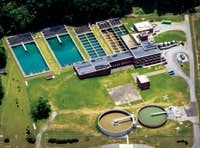With 100 years of service, the Kingsport (Tenn.) Water Filtration Plant has been providing clean water to the residents of the northeastern Tennessee city since its inception.
First established as the Kingsport Waterworks Corp. in 1914, the utility built an impounded water supply on a 1,300-acre plot that is now Bays Mountain Park. Two years later, after complaints about the taste of the drinking water, a small filtration plant was built. The city was incorporated in 1917, and at that time the utility served 1,300 metered customers using 3,000 gal per day.
The city of Kingsport purchased the utility in 1926, and by 1929 the system had expanded dramatically. A new water intake was constructed on the south fork of the Holston River, along with a new 4-million-gal-per-day (mgd) water filtration plant, and a 1-million-gal concrete tank, which is still in service today.
Throughout its operation, the plant continued to expand and upgrade, reaching its current capacity of 28 mgd, with a daily average treatment of 15 mgd. Today the plant serves 37,000 metered customers.
Traditional Treatment
The plant is a conventional treatment plant and consists of coagulation, flocculation, sedimentation and filtration.
The infrastructure consists of intake traveling screens from Screening Systems Intl. and Siemens Water Technologies; a clarifier/thickener, which dewaters the settling basin solids and backwashes the water prior to treatment at the Kingsport Wastewater Treatment Plant; five sedimentation basins; a 1.5-million-gal clearwell; three high-service pumps from Dempster, Allis-Chalmers and Fairbanks Morse; 12 filters; 22 storage tanks; a chlorine storage and feed facility; and a National Instruments SCADA system.
From the intake piping, the raw water passes through a 42-in. venturi flowmeter and a single-stage flash mix, followed by a coagulant/polymer addition and pre-chlorination. Water flows through the distribution box to five sedimentation basins. Water is chlorinated and fluoridated before it reaches the customers.
Preserving History
Although it has seen a number of upgrades throughout its lifetime, today’s plant still maintains ties to the 1929 expansion. The water filtration plant and the Holston River Pumping Station both have been designated American Water Landmarks by the American Water Works Assn. (AWWA).
Additionally, the existing 30-in. raw water transmission line dates back to 1929, as does the 6-ft tunnel through which the line passes.
“[The tunnel] is like walking back in time,” said Sam Thomason, Kingsport water treatment superintendent. “They didn’t have drilling machines and all of that back then, so there are hand pick marks where they beat the rock out, and holes from the dynamite. It’s really something to see.”
The transmission line travels up a rock bluff and is exposed to the elements. Because of this, Thomason says the line is one of the plant’s weak points and a replacement project is underway. The design phase is expected to be complete in May 2014.
The project will consist of a new raw water tunnel and a new pump station at the water treatment plant. After the replacement project, raw water will be transmitted underground toward the pump station via a 7.5-by-7.7-ft horseshoe-shaped tunnel.
Because the tunnel will end approximately 130 ft below the surface of the new pumping station, four vertical shafts will be drilled downward from the station and vertical turbine pumps will be installed in each. CDM Smith is the engineer on the project.
Another project, led by Hazen and Sawyer, will replace an existing 150,000-gal tank with a new 400,000-gal Crom tank.
Maintaining a Legacy
The Kingsport plant is part of the AWWA Partnership for Safe Water, and has won the Directors Award four years in a row. The partnership encourages treatment plants to optimize their performance by offering resources and assessment programs to improve water quality.
“Their guidelines and requirements are a little more stringent than the actual state regulations,” Thomason said. “We’re currently trying to work toward the Presidents Award.”
Thomason credits the plant’s staff for its success. All operators at the Kingsport plant are certified water treatment operators, and many also hold water distribution licenses.
“When you add everyone together, we’ve got more than 200 years of plant operator experience,” Thomason said. “They’re just a great group. I can’t say enough about them.”
Download: Here


